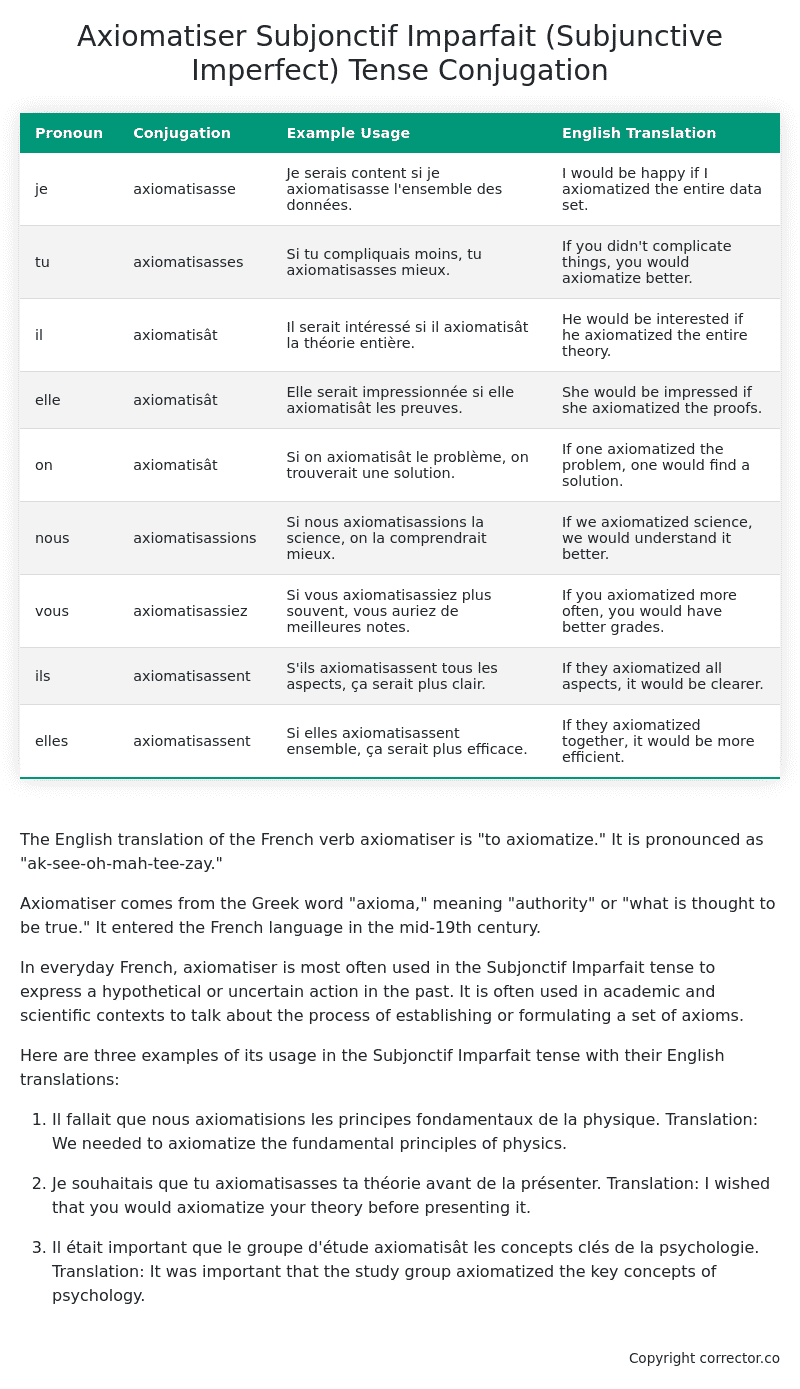Subjonctif Imparfait (Subjunctive Imperfect) Tense Conjugation of the French Verb axiomatiser
Introduction to the verb axiomatiser
The English translation of the French verb axiomatiser is “to axiomatize.” It is pronounced as “ak-see-oh-mah-tee-zay.”
Axiomatiser comes from the Greek word “axioma,” meaning “authority” or “what is thought to be true.” It entered the French language in the mid-19th century.
In everyday French, axiomatiser is most often used in the Subjonctif Imparfait tense to express a hypothetical or uncertain action in the past. It is often used in academic and scientific contexts to talk about the process of establishing or formulating a set of axioms.
Here are three examples of its usage in the Subjonctif Imparfait tense with their English translations:
-
Il fallait que nous axiomatisions les principes fondamentaux de la physique.
Translation: We needed to axiomatize the fundamental principles of physics. -
Je souhaitais que tu axiomatisasses ta théorie avant de la présenter.
Translation: I wished that you would axiomatize your theory before presenting it. -
Il était important que le groupe d’étude axiomatisât les concepts clés de la psychologie.
Translation: It was important that the study group axiomatized the key concepts of psychology.
Table of the Subjonctif Imparfait (Subjunctive Imperfect) Tense Conjugation of axiomatiser
| Pronoun | Conjugation | Example Usage | English Translation |
|---|---|---|---|
| je | axiomatisasse | Je serais content si je axiomatisasse l’ensemble des données. | I would be happy if I axiomatized the entire data set. |
| tu | axiomatisasses | Si tu compliquais moins, tu axiomatisasses mieux. | If you didn’t complicate things, you would axiomatize better. |
| il | axiomatisât | Il serait intéressé si il axiomatisât la théorie entière. | He would be interested if he axiomatized the entire theory. |
| elle | axiomatisât | Elle serait impressionnée si elle axiomatisât les preuves. | She would be impressed if she axiomatized the proofs. |
| on | axiomatisât | Si on axiomatisât le problème, on trouverait une solution. | If one axiomatized the problem, one would find a solution. |
| nous | axiomatisassions | Si nous axiomatisassions la science, on la comprendrait mieux. | If we axiomatized science, we would understand it better. |
| vous | axiomatisassiez | Si vous axiomatisassiez plus souvent, vous auriez de meilleures notes. | If you axiomatized more often, you would have better grades. |
| ils | axiomatisassent | S’ils axiomatisassent tous les aspects, ça serait plus clair. | If they axiomatized all aspects, it would be clearer. |
| elles | axiomatisassent | Si elles axiomatisassent ensemble, ça serait plus efficace. | If they axiomatized together, it would be more efficient. |
Other Conjugations for Axiomatiser.
Le Present (Present Tense) Conjugation of the French Verb axiomatiser
Imparfait (Imperfect) Tense Conjugation of the French Verb axiomatiser
Passé Simple (Simple Past) Tense Conjugation of the French Verb axiomatiser
Passé Composé (Present Perfect) Tense Conjugation of the French Verb axiomatiser
Futur Simple (Simple Future) Tense Conjugation of the French Verb axiomatiser
Futur Proche (Near Future) Tense Conjugation of the French Verb axiomatiser
Plus-que-parfait (Pluperfect) Tense Conjugation of the French Verb axiomatiser
Passé Antérieur (Past Anterior) Tense Conjugation of the French Verb axiomatiser
Futur Antérieur (Future Anterior) Tense Conjugation of the French Verb axiomatiser
Subjonctif Présent (Subjunctive Present) Tense Conjugation of the French Verb axiomatiser
Subjonctif Passé (Subjunctive Past) Tense Conjugation of the French Verb axiomatiser
Subjonctif Imparfait (Subjunctive Imperfect) Tense Conjugation of the French Verb axiomatiser (this article)
Conditionnel Présent (Conditional Present) Tense Conjugation of the French Verb axiomatiser
Conditionnel Passé (Conditional Past) Tense Conjugation of the French Verb axiomatiser
L’impératif Présent (Imperative Present) Tense Conjugation of the French Verb axiomatiser
L’infinitif Présent (Infinitive Present) Tense Conjugation of the French Verb axiomatiser
Struggling with French verbs or the language in general? Why not use our free French Grammar Checker – no registration required!
Get a FREE Download Study Sheet of this Conjugation 🔥
Simply right click the image below, click “save image” and get your free reference for the axiomatiser Subjonctif Imparfait tense conjugation!

Axiomatiser – About the French Subjonctif Imparfait (Subjunctive Imperfect) Tense
Formation
Common Everyday Usage Patterns
Interactions with Other Tenses
Subjonctif Présent
Indicatif Passé Composé
Conditional
Conditional Perfect
Summary
I hope you enjoyed this article on the verb axiomatiser. Still in a learning mood? Check out another TOTALLY random French verb conjugation!


